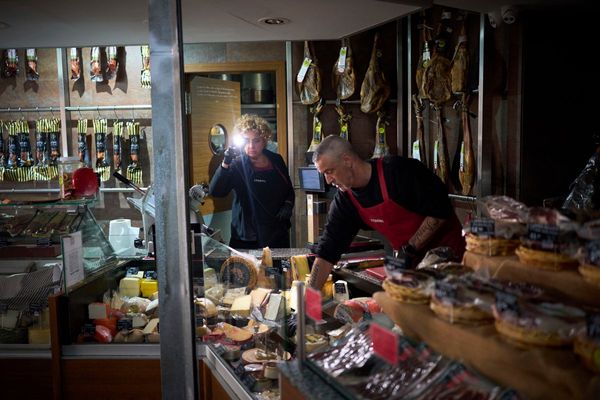An Edinburgh woman has shared how her career as a local cabbie was ruined after her back pain became "unbearable."
Adele Birkmyer, was forced to give up the job she loved after a collision on the roads inflamed a previous weakness in her back, causing severe nerve damage. Working in the industry for years, Adele had experienced back pain since she was a teenager, but had been able to manage it in order to keep her job.
However, a crash in 2011 brought the 48-year-old's career to an agonising end, causing her to spiral into a "big black hole" as she suffered both mental and physical health issues.
Adele said: "I suffered with back pain on and off since I was 15. I tried different things to manage and had massages three times a week to ease the pain and help me keep my job as a taxi driver in Edinburgh. I’d worked really hard to become a black cab driver – learning the routes, taking the exams, buying my cab – and I loved it. Whether it was the Saturday night or Monday morning crowd, the banter in the cab was always great fun.
READ MORE - Frantic East Lothian woman's plea for help after dog 'vanishes down rabbit hole'
"Until the day in 2011 when someone ran their car into the back of my taxi. After that, the pain became so much worse. I kept working, but my back was deteriorating. Sitting still was the worst thing for it. One day it was unbearable, I was in tears and knew that this was it for my career.
"24/7 pain took everything away from me – my livelihood, having fun with the kids, going to concerts with my wife, nights out with the girls, everything.
"I have severe nerve damage in my back, legs and hips and arthritis in my spine. I spent all of my savings on specialists, chiropractors, alternative medicine, massage and even an anatomist. Nothing worked. The pain was so unrelenting I didn’t even care about my health. I couldn’t worry about taking huge amounts of medication just to get through the day. My liver became damaged because of all the tablets I had to take. I put a lot of faith in doctors fixing my pain, but nothing worked; I remember pleading with a doctor that I was 39 and didn’t want to go home with a Zimmer frame."
In a bid to bring their mum out of her depression, Adele's children had booked her onto a comedy course, which even saw her go on to perform at the Edinburgh Fringe.
However, despite the "exciting experience", the side effects and chronic pain again managed to take over, with everything coming to a head while performing at a local comedy club.
Adele said: "In an attempt to try and drag myself out of the big black hole I was in, I agreed to perform at a charity comedy night. But as soon as I got on stage, I couldn’t remember any of the jokes and my act fell apart. I couldn’t think straight due to excruciating pain, painkillers and sleep deprivation.
"I broke down in tears, in front of the audience, my family, my friends. I felt like I was having a mental breakdown in front of everyone I loved. I had been trying to keep everything to myself about how I was feeling and how I was struggling to cope with the pain. I never wanted to do stand-up again. It was the lowest point of my life. I was suicidal, at rock bottom."
In a final bid to get help, Adele went back to the doctors where she was referred onto the Thistle Foundation, a charity which supports people with long-term conditions, providing rehabilitation support.
Choosing to take a lifestyle management course, Adele said the work she did there was "life changing", giving her "real hope" for the first time in years.
With the foundation this week being awarded a further £250,000 from the Scottish Government, Adele said that the charity really did "save her life."
She said: "It was first time in my life I felt really listened to and I didn’t feel that I was a burden. I couldn’t believe it. The course was life changing, it was so easy to understand and take in. I really liked that we were given a manual so I could read it and refresh my memory between the sessions.
It’s all about taking baby steps, but over the days, weeks and months, life got better and better. I’ve no doubt that Thistle saved my life and without their support I wouldn’t be here today. I’ve gone from thinking I had lost everything – my career, my role within my family, my confidence – to being in a happy marriage, spending quality time with my family and doing the things I love. My wife said she’s fallen in love with me all over again."
Mark Hoolahan, CEO of Thistle Foundation said: “It’s fantastic to see this work receive funding from the Scottish Government. It allows us to extend some of the really successful support we have been offering health and social care professionals in and around Edinburgh, the Lothians and Fife, to a broader range of teams and services across Scotland.
“At Thistle, people are at the heart of what we do. This programme is about more than supporting people with their physical health. It is about supporting people to be connected within their communities, to feel confident and resilient – it’s about thriving rather than just surviving. By situating rehabilitation within the person’s community, with support from friends, family and the community around them, people will feel more empowered to lead and manage their situation and remain as independent as possible.”
READ NEXT:
Midlothian driver nearly run off road after motorcyclist attempts reckless stunt
Plans for gigantic Edinburgh village to replace former brewery site at Fountainbridge
Plush Midlothian flat hidden inside magnificent Georgian mansion hits market
Disabled East Lothian OAP left shivering in own home due to cost of living crisis
Edinburgh police respond to crash involving stolen moped on busy city centre road







